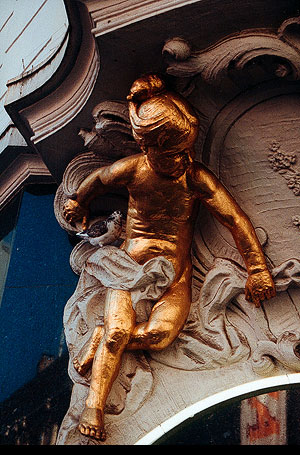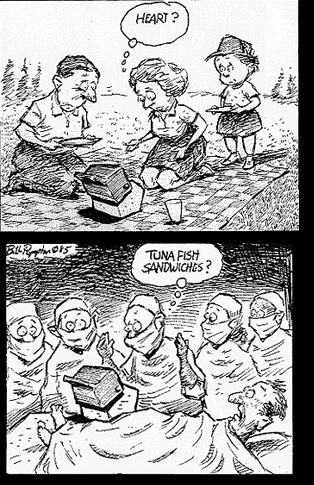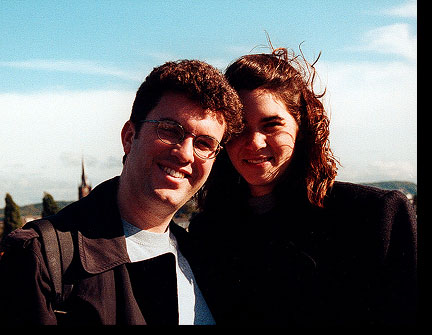 About halfway between our home in Bad Neuenahr and our favorite shopping haunts in Köln lies the smaller city of Bonn. Formerly the seat of government for West Germany, it is now the proud home of empty administration buildings; just recently, the government packed itself back to Berlin and restored capital status to a reunited city. The move, according to the rumors, took place just before our arrival here, and evidently we missed a rather significant party.
About halfway between our home in Bad Neuenahr and our favorite shopping haunts in Köln lies the smaller city of Bonn. Formerly the seat of government for West Germany, it is now the proud home of empty administration buildings; just recently, the government packed itself back to Berlin and restored capital status to a reunited city. The move, according to the rumors, took place just before our arrival here, and evidently we missed a rather significant party.
So now Bonn is desperately trying not to slip back into its pre-capitol invisibility. Construction projects pop up everywhere like the proverbial mushrooms. The city is actively luring businesses. And the tourism industry is playing up the features of the city that have nothing to do with governments. For instance, only in Bonn can you visit the house where Beethoven was born.
They're terribly proud of him here, although he wrote most of his music elsewhere. There was a Beethovenfest that ended in September. There is a Beethovenhalle. In the tourist office, there is an entire corner dedicated to him, with prints of the famous paintings, photographs of the house, and naturally, replicas of handwritten sheets of music. And in the main square, he glowers at the pigeons and the tourists alike, both ignoring him in favor of lunch around his pedistal. The mania for Beethoven has spawned a little side-line in classical musicians. You can get tiny white plaster busts of nearly 40 composers, all in a series, a couple Bachs and several Strausses included.
We've yet to make it to an event in the Beethovenhalle, but we take regular excursions into Bonn, at least once every two weeks, sometimes more. There are two features to the city that are making their delightfully insidious way into our lives: the Waschsalon and the Brotfabrik.
|
 Shortly after settling in Bad Neuenahr, we began the hunt for the German method of cleaning clothes. After much searching, we concluded that either everyone has a washer and dryer in their home or everyone uses the washing services (there are two of them in Bad Neuenahr alone), where they fold your t-shirts with crisp creases and press your underware. The price tag attached to this kind of thorough service is more than we could see spending on the laundry, so Ian spent a sizable bit of time at the local tourist information office explaining that we needed a self-service laundromat. Evidently, the last one for nearly 50 kilometers went out of business about a year ago; not enough things to wash.
Shortly after settling in Bad Neuenahr, we began the hunt for the German method of cleaning clothes. After much searching, we concluded that either everyone has a washer and dryer in their home or everyone uses the washing services (there are two of them in Bad Neuenahr alone), where they fold your t-shirts with crisp creases and press your underware. The price tag attached to this kind of thorough service is more than we could see spending on the laundry, so Ian spent a sizable bit of time at the local tourist information office explaining that we needed a self-service laundromat. Evidently, the last one for nearly 50 kilometers went out of business about a year ago; not enough things to wash.
So we make the drive to Bonn regularly to visit the Waschsalon, where it costs DM 8 to run a washing cycle, the locale comes with these very cool, very speedy centrifuges since there isn't much of a spin cycle on the washing machines, and the whole process from dirty to dry can be completed for 5 loads in just under 2 hours, if there's no one else there. Ian goes for walks while we are washing and he has discovered several various ethnic fast foods, including both Greek and Chinese, as well as an Asian foods store with spicy ginger bonbons. Doing the laundry is becoming a culinary experience.
Speaking of culinary experiences: we have found a place that manages to combine movies and dinner. The Brotfabrik is an old bread factory which has transmogrified itself into an art center with our favorite Kino (film theatre). Tucked back in the corner, it's just down the street from a tiny cemetery with little weather shelters for the candles, so the memorials go on burning, filling the yard with tiny flickering red lights and making the place sparkle strangly in the night as you walk by, and just around the corner from a pizza place which thinks of Tabasco as a pizza topping. Art exhibits grace the lobby area, and off the corners of the lobby are a dance studio, a theatre for stage productions, a restaurant, and a movie theatre. Still drinking when it's time to go into the film? Take your glass with you.
|
 The theatre is tiny, seating perhaps only 30. It made a nice, intimate setting for the first film we saw there, Mondo Plympton, a retrospective of the work of Bill Plympton, a surrealist cartoonist. He does cartoons of faces turning themselves inside out and of deeply consuming kisses, as well as the gem to the left. Because we didn't know much about the place before we arrived, we showed up early and while wandering around the lobby studying the art exhibit and trying to read the German newspaper clippings, we realized there was a gentleman with a definite American accent speaking with one of the employees of the Brotfabrik. After enough evesdropping, we had a theory but were fairly certain that it was just wishful thinking on our part. What would Bill Plympton, famous cartoonist, be doing in a very tiny theatre in Bonn?
The theatre is tiny, seating perhaps only 30. It made a nice, intimate setting for the first film we saw there, Mondo Plympton, a retrospective of the work of Bill Plympton, a surrealist cartoonist. He does cartoons of faces turning themselves inside out and of deeply consuming kisses, as well as the gem to the left. Because we didn't know much about the place before we arrived, we showed up early and while wandering around the lobby studying the art exhibit and trying to read the German newspaper clippings, we realized there was a gentleman with a definite American accent speaking with one of the employees of the Brotfabrik. After enough evesdropping, we had a theory but were fairly certain that it was just wishful thinking on our part. What would Bill Plympton, famous cartoonist, be doing in a very tiny theatre in Bonn?
Doing a self-promotional tour, of course. He was handing out cards with his web address, selling cells and sketches from his animations, and autographing copies of We Eat Tonight!, a collection of cartoons. I'm not sure who was more surprise, Ian and myself that Bill Plympton was there or Mr. Plympton that there were Americans at this screening in Germany. He spoke about his life and his work as an independant animator before the film and during the break between halves and then answered questions afterwards. A little tiny film festival tucked away in a little tiny theatre in a city in Germany . . . what a way to start our quest for English language films.
We've discovered that Germany tends to dub every non-German language film into German for the primary releases, rather than subtitling. So we have found ourselves in the novel position of seeking major Holloywood releases in small art house theatres. Ian has become the movie guru for the group of us here, finding the theatres and the showtimes and announcing when we will be going to Bonn or Köln. There is a Kino in Köln which has become the place to go for movies like Fight Club or eXistenZ, both recent releases here. The Brotfabrik is good for older films, like Hitchcock's North by Northwest which we've seen and Monty Python's Life of Brian, which is coming up. It's been fun having to find our movies in arthouse theatres; it's giving us the opportunity to see important or less marketed movies on a bigger screen.
|
 Odd, how you don't realize the convience of things that become important to you until they are hard to find. But there are so many little things we might not discover if we didn't have to search out the details: theatres, restaurants, fresh fruit markets, saintly architechure, church bells, spectacular natural lighting, eis cafes (ice cream parlors), hot roasted chestnuts, the occasional graffitied banana, stray bits of left-over Roman roads. It's a bit like finding seashells when you are looking for sand crabs. Who knows where the details will lead us next?
Odd, how you don't realize the convience of things that become important to you until they are hard to find. But there are so many little things we might not discover if we didn't have to search out the details: theatres, restaurants, fresh fruit markets, saintly architechure, church bells, spectacular natural lighting, eis cafes (ice cream parlors), hot roasted chestnuts, the occasional graffitied banana, stray bits of left-over Roman roads. It's a bit like finding seashells when you are looking for sand crabs. Who knows where the details will lead us next?
|

